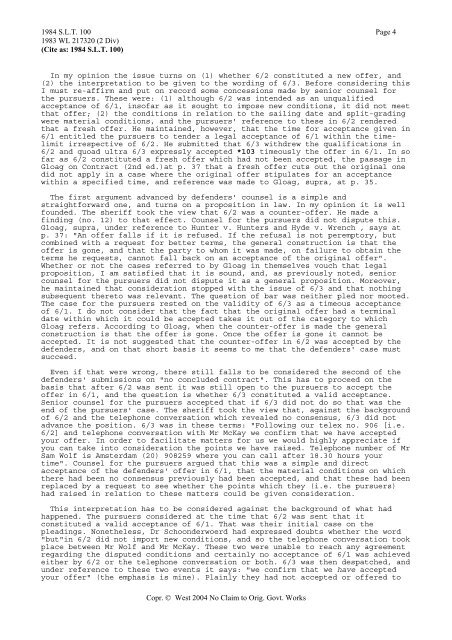Tesco v Constain - Thomson Reuters
Tesco v Constain - Thomson Reuters
Tesco v Constain - Thomson Reuters
Create successful ePaper yourself
Turn your PDF publications into a flip-book with our unique Google optimized e-Paper software.
1984 S.L.T. 100 Page 41983 WL 217320 (2 Div)(Cite as: 1984 S.L.T. 100)In my opinion the issue turns on (1) whether 6/2 constituted a new offer, and(2) the interpretation to be given to the wording of 6/3. Before considering thisI must re-affirm and put on record some concessions made by senior counsel forthe pursuers. These were: (1) although 6/2 was intended as an unqualifiedacceptance of 6/1, insofar as it sought to impose new conditions, it did not meetthat offer; (2) the conditions in relation to the sailing date and split-gradingwere material conditions, and the pursuers' reference to these in 6/2 renderedthat a fresh offer. He maintained, however, that the time for acceptance given in6/1 entitled the pursuers to tender a legal acceptance of 6/1 within the timelimitirrespective of 6/2. He submitted that 6/3 withdrew the qualifications in6/2 and quoad ultra 6/3 expressly accepted *103 timeously the offer in 6/1. In sofar as 6/2 constituted a fresh offer which had not been accepted, the passage inGloag on Contract (2nd ed.)at p. 37 that a fresh offer cuts out the original onedid not apply in a case where the original offer stipulates for an acceptancewithin a specified time, and reference was made to Gloag, supra, at p. 35.The first argument advanced by defenders' counsel is a simple andstraightforward one, and turns on a proposition in law. In my opinion it is wellfounded. The sheriff took the view that 6/2 was a counter-offer. He made afinding (no. 12) to that effect. Counsel for the pursuers did not dispute this.Gloag, supra, under reference to Hunter v. Hunters and Hyde v. Wrench , says atp. 37: "An offer falls if it is refused. If the refusal is not peremptory, butcombined with a request for better terms, the general construction is that theoffer is gone, and that the party to whom it was made, on failure to obtain theterms he requests, cannot fall back on an acceptance of the original offer".Whether or not the cases referred to by Gloag in themselves vouch that legalproposition, I am satisfied that it is sound, and, as previously noted, seniorcounsel for the pursuers did not dispute it as a general proposition. Moreover,he maintained that consideration stopped with the issue of 6/3 and that nothingsubsequent thereto was relevant. The question of bar was neither pled nor mooted.The case for the pursuers rested on the validity of 6/3 as a timeous acceptanceof 6/1. I do not consider that the fact that the original offer had a terminaldate within which it could be accepted takes it out of the category to whichGloag refers. According to Gloag, when the counter-offer is made the generalconstruction is that the offer is gone. Once the offer is gone it cannot beaccepted. It is not suggested that the counter-offer in 6/2 was accepted by thedefenders, and on that short basis it seems to me that the defenders' case mustsucceed.Even if that were wrong, there still falls to be considered the second of thedefenders' submissions on "no concluded contract". This has to proceed on thebasis that after 6/2 was sent it was still open to the pursuers to accept theoffer in 6/1, and the question is whether 6/3 constituted a valid acceptance.Senior counsel for the pursuers accepted that if 6/3 did not do so that was theend of the pursuers' case. The sheriff took the view that, against the backgroundof 6/2 and the telephone conversation which revealed no consensus, 6/3 did notadvance the position. 6/3 was in these terms: "Following our telex no. 906 [i.e.6/2] and telephone conversation with Mr McKay we confirm that we have acceptedyour offer. In order to facilitate matters for us we would highly appreciate ifyou can take into consideration the points we have raised. Telephone number of MrSam Wolf is Amsterdam (20) 908259 where you can call after 18.30 hours yourtime". Counsel for the pursuers argued that this was a simple and directacceptance of the defenders' offer in 6/1, that the material conditions on whichthere had been no consensus previously had been accepted, and that these had beenreplaced by a request to see whether the points which they (i.e. the pursuers)had raised in relation to these matters could be given consideration.This interpretation has to be considered against the background of what hadhappened. The pursuers considered at the time that 6/2 was sent that itconstituted a valid acceptance of 6/1. That was their initial case on thepleadings. Nonetheless, Dr Schoonderwoerd had expressed doubts whether the word"but"in 6/2 did not import new conditions, and so the telephone conversation tookplace between Mr Wolf and Mr McKay. These two were unable to reach any agreementregarding the disputed conditions and certainly no acceptance of 6/1 was achievedeither by 6/2 or the telephone conversation or both. 6/3 was then despatched, andunder reference to these two events it says: "we confirm that we have acceptedyour offer" (the emphasis is mine). Plainly they had not accepted or offered toCopr. © West 2004 No Claim to Orig. Govt. Works
















